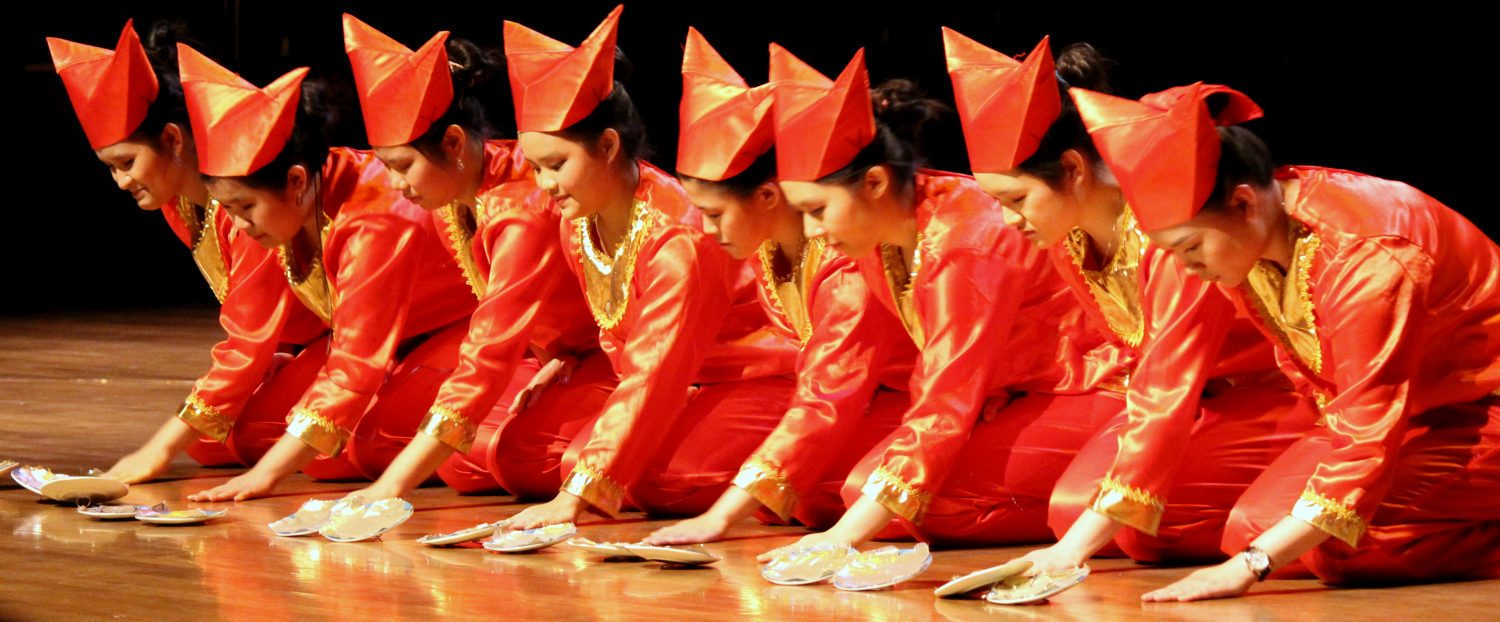“Color, culture and diversity; that is what Rangeela is about,” said master of ceremonies Jed Bell.
This year’s Rangeela performance — which sold out four days before the Friday opening — proved that these things are indeed what Calvin is all about.
This year, 180 students participated in 11 acts. While the show featured such repeated favorites as the Indian and African dance acts, this year’s performance dropped a couple well-known acts, such as the hip-centric Tahitian dance, but replaced them with new and equally entertaining and culture-rich acts, not always dances. The Navajo act, for example, featured a story of how the cosmos came into being.
“At first, I wasn’t a huge fan of the Navajo act,” said junior Audrey Hughey, “but I found myself getting into the story towards the end. I like that Rangeela isn’t just all dancing, it has other cultural expressions, as well.”
“I think my favorite act was the African a cappella group,” said junior Christina Hill. “It was really beautiful. There weren’t really any acts that I didn’t like; I thought the entire show was awesome.”
The Mexican, Peruvian and Caribbean acts offered a taste of the rich diversity in an area that is typically lumped together by stereotype. The African acts provided more context to the different countries and cultures when compared with last year. And the Indonesian and Chinese acts diverted from the norm to give the audience a look at the other equally beautiful sides of the respective cultures.
The Rangeela Committee chose “study abroad” as the theme for this year’s show.
“It’s educational,” said this year’s Rangeela director Esther Kwak. “It shows that you don’t necessarily have to study abroad to learn about other cultures.”
“I think the theme is rather splendid,” said Kofi Akyeampong, leader of the African Dance act. “Many people have to learn a lot about our culture … [At Rangeela], all you have to do is be attentive and learn [without books]. If that’s how classes were at Calvin, who wouldn’t want to take that? It’s really genius.”
Along with the themes, the structure of Rangeela as an organization has changed since its inception in 1996. Its creator, Egyptian student Anne Zaki, decided to replicate a show her high school in Canada, where she had been an exchange student, would put on each year. The first free show was Thursday night in old Fine Arts Center (FAC) and 600 students showed up to watch.
In 1998, when there was still no charge and the show had moved to Saturday night. Every seat was occupied in the FAC, even overflowing to the aisles.
The following year, Rangeela leadership charged admission. A few years after that, the show’s popularity demanded it become a two-night event.
Now, in 2013, Rangeela is no longer even a student organization. Due to budget and complaints from professors that the time students put into Rangeela was affecting their studies, Rangeela converted to a non-student organization under the authority of the international student association committee and the international student development office. As such, many changes manifested themselves in this year’s show.
“We had to totally revamp the mission statement and focus on education,” said Kwak. “First, with participation. The students are learning about the traditions and cultural background for the act they are in. Second, the audience. We don’t want them to just attend to watch and leave, but also to embrace this great opportunity.”
Besides limiting the number of acts in which students can participate to two, students have not experienced much change from the transition.
“There hasn’t been a substantial difference on the participant end,” said participant junior Nathan Phillips.
“I’ve heard from some tech people that there have been communication challenges,” said Chinese act leader Emily Larken. “But there are always going to be things that go wrong after a big change. I’m just glad we still get to do this.”
And while most students agree, tension still underlines the line between openness and authenticity, as some acts remain closed to those not from the country represented in the act.
“I definitely respect the fact that people should be given a chance in trying to join in the showcase, however, people should also respect the fact that there are just some acts that need to be done or are best done by people of the same culture,” said Akyeampong.
“It’s entirely up to the leaders,” said Emily Larken, the Chinese act leader. “The faces aren’t the point. The point is making something beautiful. What it comes down to is is the experience more important than the dance, or is it to experience the dance as authentically as possible?”
All in all, though, Rangeela rarely leaves people wanting and has members returning each year because they believe in what Rangeela is all about.
“I love that we get to learn the values of other cultures,” said Larken. “What they think is beautiful.”
“Rangeela is important because it reminds us that there is more going on around the world than just what’s happening with our own lives,” said senior participant Lea Boehlke. “It gives us a chance to experience different cultures and may even spark within us a curiosity to learn more.”
“We’re all coming together to praise God for diversity,” said Kwak. “And what’s not great about that?”








